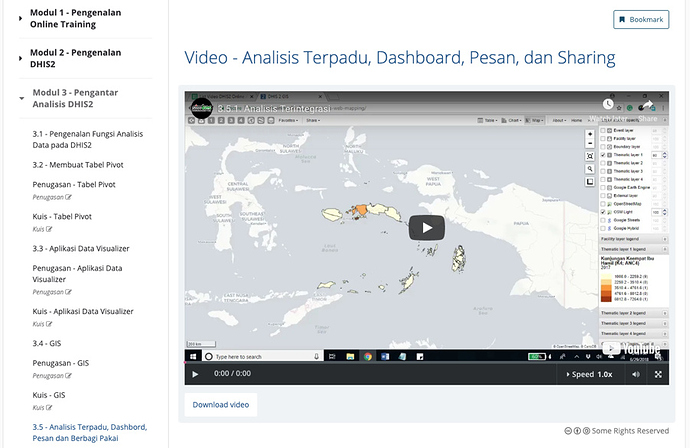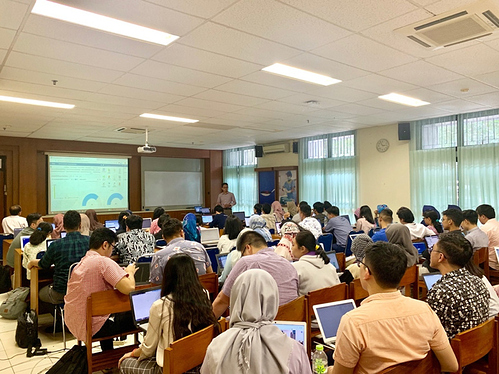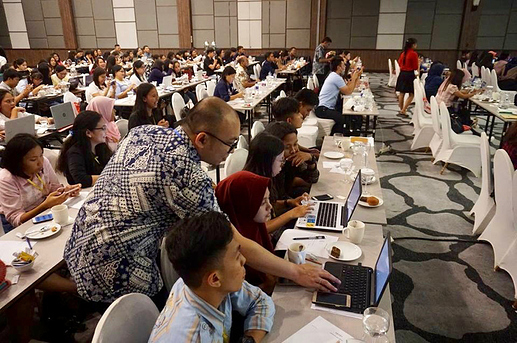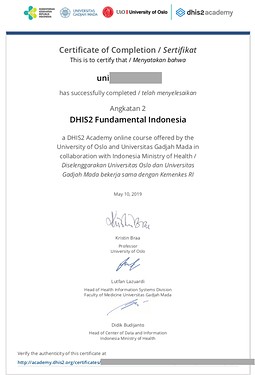DHIS2 Indonesia Online Academy: 1) adjusted curriculum, 2) translated content & learning platform, 3) local database (data elements, indicators, map, and data)
Localizing a global digital platform
What are the basic principles for localizing a global digital learning platform?
- Creating a local team and defining a training strategy together
- Ensuring capacity building translation instead of transfer
- Obtaining government ownership
- Gaining and using momentum
- Engaging local academic institutions to optimize utilization and development
- Comprehensive monitoring and evaluation methods.
(Pointers above are taken from this paper)
Indonesia takes the lead
What does this look like in practice?
The DHIS2 Online Academy supports in-country capacity strengthening by offering massive open online courses (MOOCs) and developing digital training packages that can be localized to suit in-country needs. Indonesia stands out as the first country to adopt and adapt such package. In 2016, Indonesia started implementing DHIS2, and due to its great impact, the Ministry of Health (MoH) announced the DHIS2 expansion plan in 2018, involving thousands of staff members from various public sectors. Based on the ambitious plan, the country needed a solution to reduce training time and costs, while at the same time quickly fulfilling field demands of trained implementors.
Photo: UGM introduced the localized online course to medical school students prior to their community service assignment
Since the online course launch in August 2018, the course has been either delivered entirely online or in combination with face-to-face trainings conducted by MoH and local universities. Through formal (degree) and informal pathways, the course has been used to prepare healthcare workers for their future work by exposing them to the platform that is nationally implemented.
To date, 1,074 learners have enrolled for the course and 261 learners from public sectors, academics, and NGOs have received certificates of successful completion. However, the course team has recognized challenges for example those related to retention rate, maintenance related to DHIS2 version updates, linking training instance with live instance used by the ministry, and expansion to other data management-related skills to ensure more meaningful capacity building.
Photo: Three local universities in eastern Indonesia (UNSRAT, UNIMA, and Trinita University) delivered the localized online course to over 250 students and health officers in collaboration with UiO
DHIS2 Fundamentals Indonesia
The implementation of DHIS2 Fundamentals Indonesia went through four phases. In the pre-production phase, the Indonesia team was introduced to the global DHIS2 Online Academy framework and specifically to the DHIS2 Fundamentals as the ‘template’. They also participated in and familiarized themselves with global and regional DHIS2 Academies. During this process, government buy-in was obtained through advocacy. University of Gadjah Mada (UGM) was engaged as the main local academic institution partner to tackle day-to-day implementation and maintenance in the country. MoH, University of Oslo (UiO), and UGM developed a national capacity building framework following the global DHIS2 Academy framework that includes digital learning. The team started the production phase by adjusting the course structure to suit local contexts.
First, pre and post-tests were added to evaluate learning outputs following level 2 Kirkpatrick’ evaluation model. Then, DHIS2 maintenance and trackers modules were replaced with modules on: 1) implementation strategies in districts, 2) data integration, and 3) data quality. Country database (maps, data elements, indicators and data) and health programs are utilized in all learning objects such as presentations, videos, quizzes, and assignments. All these existing and new learning materials were either translated into or developed in Indonesian. The standard Trainingland was also replaced by Indonesia Trainingland for hands-on learning. Upon course completion, each eligible learner receives bilingual certificate signed by Indonesia MoH, UGM, and UiO. To support learners, the national team also establish a separated support channel in Indonesian.
Above: Certificate of our first graduate (name and id are hidden for security)
This use case was developed in collaboration with Aprisa Chrysantina (UiO), Guardian Sanjaya (UGM), Farida Sibuea (Indonesia MoH); and presented at AIS Indonesia Chapter Conference in July 2019; and will be published in Procedia Computer Science. See the preprint here.



